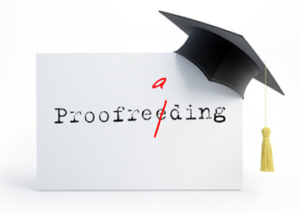Congratulations! You’re going to graduate summa cum laude from a top university, and you’re applying for internships in hopes of eventually landing a full-time position. You have great work experience, relevant coursework, and joined all the appropriate clubs and college networks at your school. But wait, what’s this? Your resume has a few mistakes? You left an empty bullet point under your most relevant internship experience? You sent us a cover letter meant for another company? Yes, these have happened, and unfortunately, more often than we would hope.

A resume is your life blood when applying for a job. It represents who you are, and you should take pride in it when sending it to a potential future employer, especially when this is the first, and only, document the employer will use to decide if you get an interview. No one wants to be removed from consideration because of a silly mistake, so before hitting send, proofread everything and ask others to proofread it as well. Your future, employed self will thank you later.
Since the office has been very busy, I’ve started to help VP and Internship Coordinator Nicole sort through the many resumes we receive every day for internship opportunities. I go through the stack and send over the acceptable resumes to Nicole. Please take note: I look for relevant PR experience or coursework; clean, clear and consistent formatting; and no errors. Not one or two errors. Zero.
By now, I’ve seen every resume flaw in the book, but here are a few repeat offenders that will guarantee you will not be hearing from us:
- Spelling and grammatical errors. Please, make sure your major is spelled correctly. And please, make sure your school is spelled correctly. While these are easy mistakes to make, they are even easier mistakes to fix when you proofread your resume. If you have worked tirelessly at your resume and simply cannot look at it anymore, have a friend or family member read through it. A second set of eyes can always help, and will identify what needs to be fixed.
- Inconsistent spacing or format errors. Like I said before, I’ve seen resumes with empty bullet points on them. I’ve seen the use of too many spaces between sections, causing the resume to be longer than one page (more on that later). Please make sure you have consistently lined up all of your sections, formatted each new section the same way, and used the same colors, fonts and symbols throughout the entire document. This allows the reader to look at each section and locate the exact information she wants, and it also shows that you can lay out information in a clear and concise way. Plus, it’s easier to read, and we appreciate how considerate you are for thinking of us.
- Too much information. Sometimes too much information can hurt you. Your resume should list all of your recent, relevant experience on one page. We are glad to see you’ve been a great leader since sophomore year in high school by tutoring middle schoolers, but that was 6 years ago. We are glad you enjoy “finding the best brunch spots and dancing.” However, these are examples of topics welcomed in the interview to highlight your personality (and believe me, we love brunch here and could use the help finding new spots). Use the space on your resume for important information like relevant coursework, college scholarship information, university honors, or class projects instead. And, don’t forget, please keep this information to one page.
- Incorrect information, and other careless mistakes. There have been times when we look at a very strong resume in the pile and think, “We could extend the job offer to that applicant without even an interview, but look at the cover letter.” We’ve had cover letters addressed to a different agency, with the wrong year, and sometimes both. Proofreading could have prevented that. How can we bring someone in for an interview, if he or she couldn’t name our agency correctly in the cover letter?
- List your most relevant experience first, even if it’s not your most recent. This isn’t really a mistake, but more of a helpful tip. I know some school career counselors will tell you to list your work experiences in chronological order, and yes, employers like that. However, if you’re applying for another public relations internship, list your previous PR internship first. Your PR experience outweighs your part-time swim instructor position, even if the internship happened last year. You earned that experience and now is your chance to say, “This is what I’ve learned and this is what I can bring to the table.”
No one is perfect. Everyone is human. We get that, because we are humans, too. However, if you’re applying for a position in a public relations agency, you’re likely seeking a writing-intensive job. If your resume is filled with mistakes, how can we trust you to write a press release for a client? Our clients will not (and should not) tolerate careless mistakes from us, so we can’t hire someone who doesn’t proofread their own resume. If you don’t like to proofread, you might want to ask yourself if public relations is right for you.
There are so many more things to add to your list! Spelling my name wrong, addressing me as Mr., praising us on a campaign that belongs to another firm. I could go on and on. Your resume and cover letter are your first opportunity to impress me. If you don’t take the time to make it the best it can be, how can I trust you with important client work?
Great post!
Thank you, Abbie, for your spot-on comments. You, too, have probably seen everything in the way of “what not to do.” I’m always amazed at cover letters that mention another agency instead of ours.
Anne